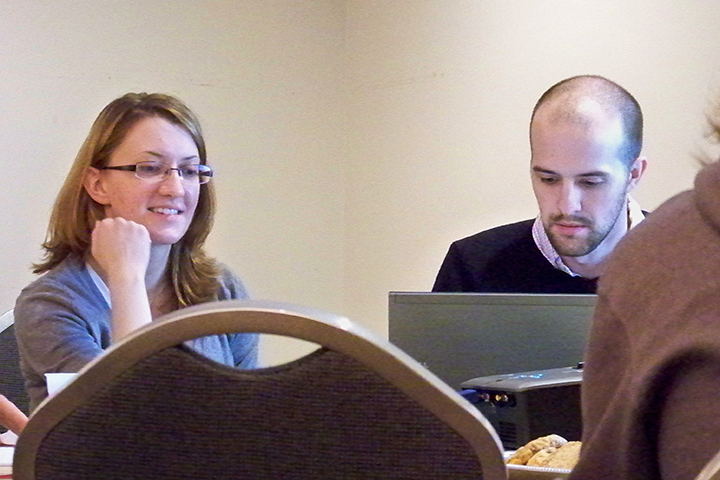Illinois State’s first Climate Change Day started with a Nobel Prize-winning climate scientist and ended with a small group of likeminded students kicking around real ideas for on-campus sustainability projects.
Junior renewable energy major Andrew Verderber was part of that group, which brainstormed for several hours Monday afternoon at Bone Student Center’s Circus Room. Huddled around a table with a laptop, they were looking for viable ideas that could earn some of the $5,000 in available project funding.
The consensus, Verderber said, was that they should find collaborative ideas that overlapped. Verderber, who once built a miniature solar-powered house for a class project, helped pitch the idea for a rain barrel with a solar-powered pump for the existing campus herb garden that others around the table want to revitalize.
“It’s cool to bring everyone together and bounce around ideas,” Verderber told STATEside. “It’s about being part of something bigger than just your world.”
The three-part Climate Change Day kicked off Monday morning with keynote speaker Don Wuebbles, a University of Illinois professor who shared in the 2007 Nobel Peace Prize for his work with the international Intergovernmental Panel on Climate Change. | WGLT coverage of Wuebbles visit
Wuebbles’ speech, which inspired the full day of activities, was followed by five quick overview presentations—20 slides max, 20 seconds per slide—from different organizations about their sustainability projects.
Then, it was time for student project development. A State Farm facilitator was brought in to lead what’s called an “open space” meeting, which creates a physical marketplace of ideas in a single room.
“We tried to bring in what they’re doing in the corporate world,” said Missy Nergard, director of the Office of Sustainability, which helped promote the event with a zombie mob and other outreach.
The student projects being kicked around included the herb garden revitalization and a related “living wall” within it, a composting option for off-campus students, and energy-use monitoring. Selected student-proposed plans will receive funding of up to $1,000 each, funded by the Katie School of Insurance and Financial Services in the College of Business, one of the Climate Change Day partners.
Junior Andrew Gumbiner wants to get the herb garden, located near Tri-Towers, back on track. He plans to tend the garden all summer and would like to see it provide herbs to the campus dining centers.
Gumbiner has been interested in sustainability issues since he was a kid helping his mother garden, later picking up cooking as a hobby. (It also helps that Earth Day is his birthday.) Gumbiner, who hopes to work in renewable energy, said he chose biochemistry as his major to get scientific insight into environmental issues.
“That way, I could understand why things are happening,” said Gumbiner, who also has a minor in global sustainability.
But it’s not just science majors with a professional interest in climate change. Environmental issues are now an unavoidable part of doing business for American companies, said James Jones, director of the Katie School and one of the organizers of Climate Change Day.
Business decisions—from energy use to transportation costs to materials—are more intertwined than ever with the environment, he said. And savvy customers are increasingly able to differentiate between businesses that carry a green track record and those who don’t.
“Business exists in the environment. There’s no escape from it,” Jones told STATEside. “In ignoring it, you’re going to find it still catches up with you.”
Ryan Denham can be reached at rmdenha@IllinoisState.edu.


